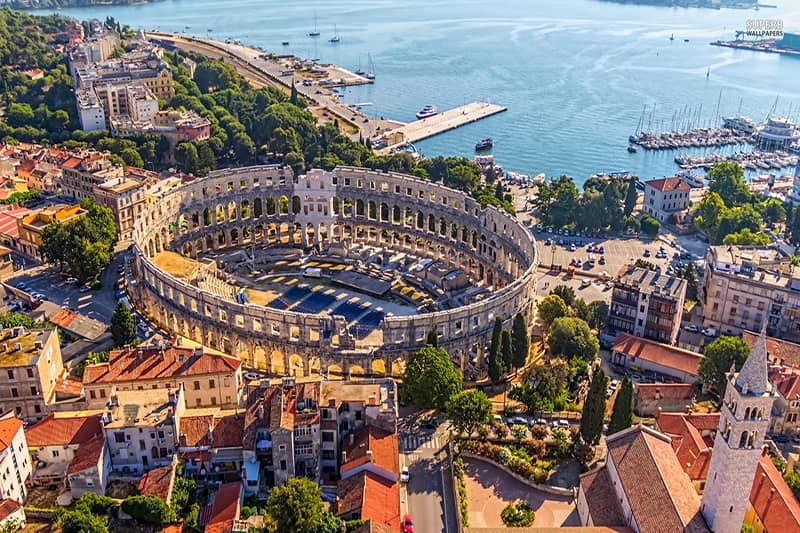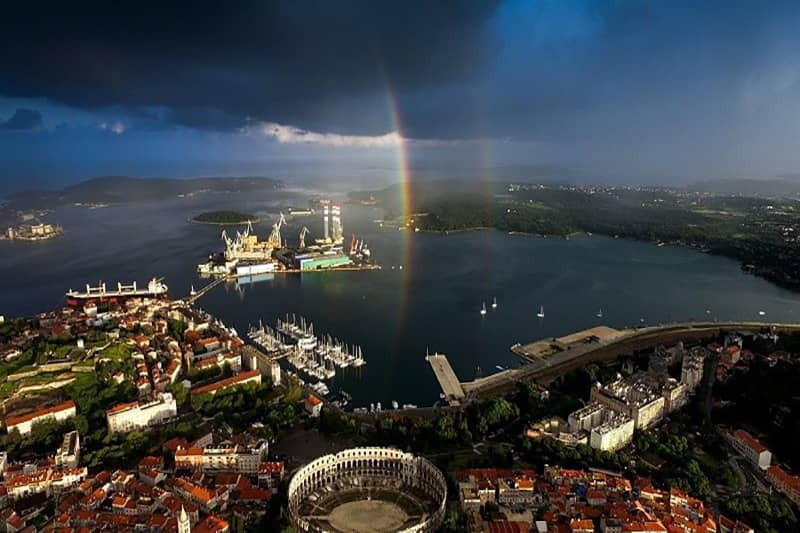About Pula
Population - 57460
Pula was founded almost three thousand years ago when, according to legend, the son of the King of Colchis and his men chased Jason and the Argonauts who had stolen their famous golden fleece. When the king’s son was killed, his men were too frightened to return home and so founded Pula. In the 3rd century BC there was a well-developed trade with the Greeks which has been proven by archaeological finds. The Roman conquest of the Istrian Peninsula gave special importance to Pula. Roman authority was established after 177 BC. In the 2nd half of the first century BC, Pula became a military stronghold. Pula continued, during these times, to conform to traditional Roman city or urban ideas. The large amphitheater was built in the 1st Century. It is the 6th largest preserved amphitheater in the world and could accommodate 20,000 spectators. Christian churches started to appear as early as the 4th Century and the cathedral of Saint Mary was built in the 5th Century. Pula remained an important Roman port until the close of the 5th Century. But in the 6th Century, the city came under Byzantine rule. Towards the end of the 8th Century there came a period of Frankish rule. Then in the middle ages it came under the control of Venice. Because of various conflicts, Pula suffered a period of unrest under Venetian rule. In 1379 the Venetian fleet was defeated and Genoa captured the city, plundered and destroyed it. The region suffered from the loss of its population and was affected by plague and much of the classical architecture of the city was ruined. A new fort and several fortifications were constructed in the 17th Century when the Venetians had re-established rule. After the fall of Venice in 1797 Pula fell to the Austrian empire and became, after 1866, the main base of the Austrian Imperial Navy
WHOMate Parlov was born in Pula, he was known for winning one of his biggest boxing titles, the WBC world title in Milan, defeating Miguel Ãngel Cuello and becoming the professional world champion in the light-heavyweight category. He passed away on July 28th, 2008 and is the only Croatian boxer to have won all possible titles, European and World amateur champion, Olympic champion and European and World professional champion. WHEREFor mainstream clubbing, arrange for the taxi driver to head north-east of the centre. The best venue there is Aruba, with a bar outdoors and crowded two-room disco inside. Club Uljanik right in the city centre has been going since the ’60s and still boasts a strong year-round roster of alternative bands and DJ nights, and opens up a big outdoor terrace in summer. WHATThe crystal clear Adriatic Sea is a noble provider and inseparable part of the local people. Seafood, in addition to the gold of the olive oil, is the main reason behind the longevity and health of people from the Mediterranean. Istrian ham is the pride of the Istrian man, his symbol for the benefits of a balanced rhythm with Nature. The king of Istrian gastronomy/cuisine, its majesty the Truffle is a true delicacy and a true gem for connoisseurs.











